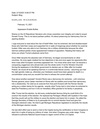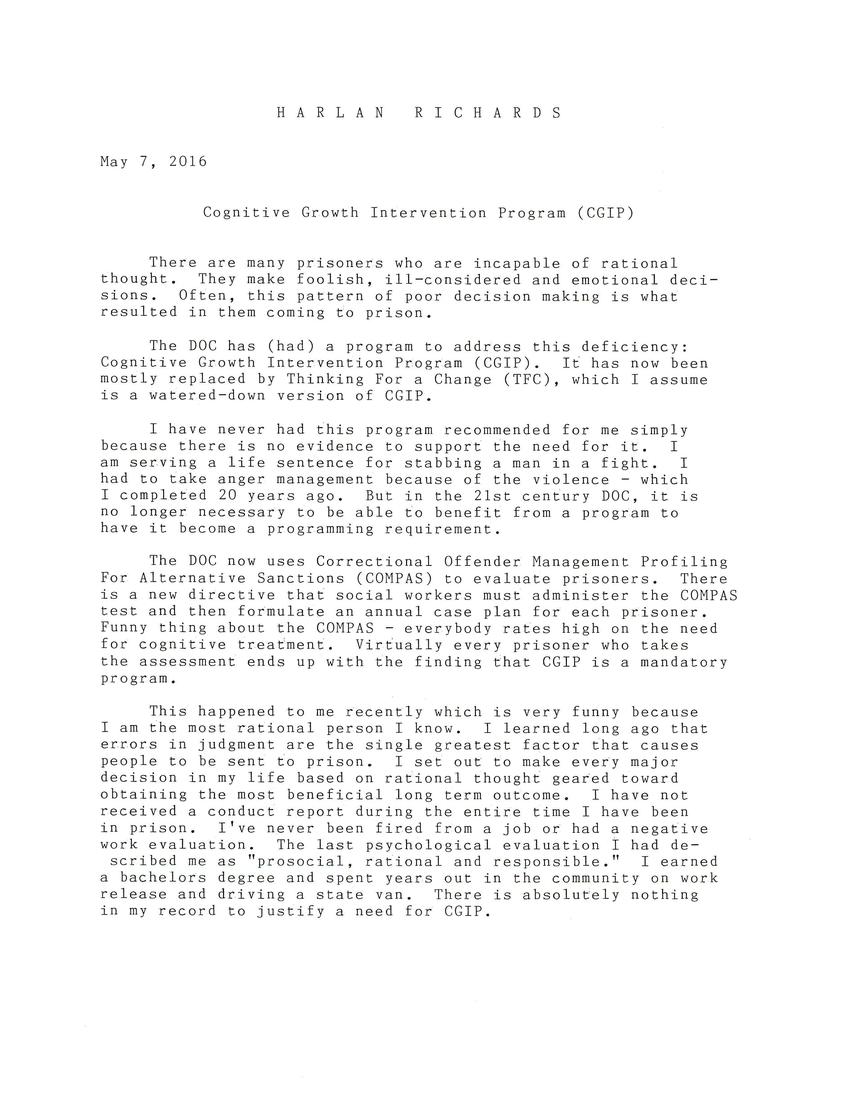

Transcription
HARLAN RICHARDS
May 7, 2016
Cognitive Growth Intervention Program (CGIP)
There are many prisoners who are incapable of rational thought. They make foolish, ill-considered and emotional decisions. Often, this pattern of poor decision-making is what resulted in them coming to prison.
The DOC has (had) a program to address this deficiency: Cognitive Growth Intervention Program (CGIP). It has now been mostly replaced by Thinking For a Change (TFC), which I assume is a watered-down version of CGIP.
I have never had this program recommended for me simply because there is no evidence to support the need for it. I am serving a life sentence for stabbing a man in a fight. I had to take anger management because of the violence—which I completed 20 years ago. But in the 21st century DOC, it is no longer necessary to be able to benefit from a program to have it become a programming requirement.
The DOC now uses Correctional Officer Management Profiling For Alternative Sanctions (COMPAS) to evaluate prisoners. There is a new directive that social workers must administer the COMPAS test and then formulate an annual case plan for each prisoner. Funny thing about COMPAS—everybody rates high on the need for cognitive treatment. Virtually every prisoner who takes the assessment ends up with the finding that CGIP is a mandatory program.
This happened to me recently which is very funny because I am the most rational person I know. I learned long ago that errors in judgment are the single greatest factor that causes people to be sent to prison. I set out to make every major decision in my life based on rational thought geared toward obtaining the most beneficial long term outcome. I have not received a conduct report during the entire time I have been in prison. I've never been fired from a job or had a negative work evaluation. The last psychological evaluation I had described me as "prosocial, rational and responsible." I earned a bachelor's degree and spent years out in the community on work release and driving a state van. There is absolutely nothing in my record to justify a need for CGIP.
I explained all this to the classification committee and expected them to agree with me. They told me I was doing great but I was still being assigned to do the program. Oh well, I can do the program, no big deal. Except for one thing:
The COMPAS assessment which found that I needed CGIP also determined that I scored low for the likelihood of violent recidivism and general recidivism. My overall COMPAS risk level recommendation is low. Because I am already low risk to re-offend, I am disqualified from taking CGIP. I will always have the CGIP need but never be able to take it. The problem with this is when I see the parole commission, I'll be denied release on parole because I have an unmet program need. I'm caught in a catch-22 situation. I have a program requirement I can never fill and won't get a parole unless I complete the program.
The absurdity of this situation is mind boggling. The DOC has done the exact same thing to thousands of prisoners. Here we all sit, mandated to take the same program which none of us needs and are unable to take because we are all rated as low risk.
I am living in a nightmare which has no end and which keeps getting worse.

Other posts by this author
|
2021 jun 25

|
2021 may 25

|
2021 apr 23

|
2021 feb 19

|
2021 feb 17

|
2021 feb 15

|
More... |



Replies